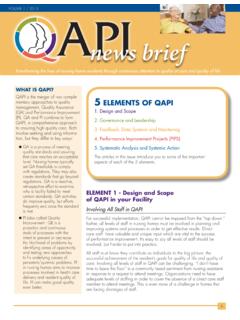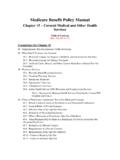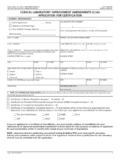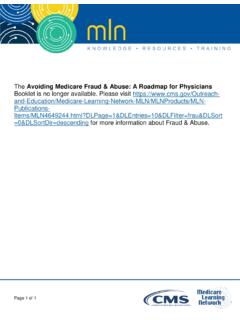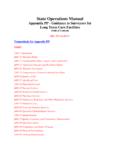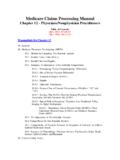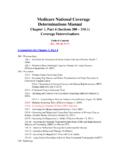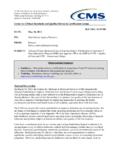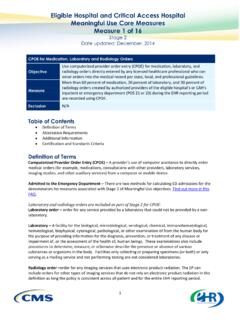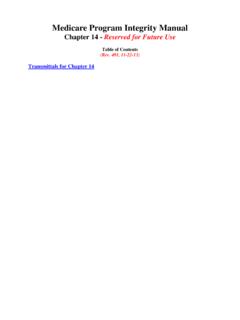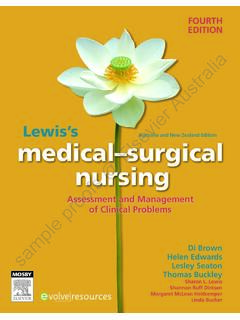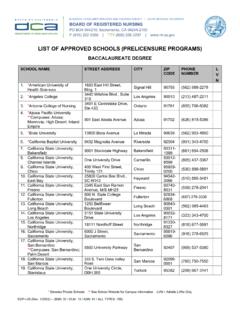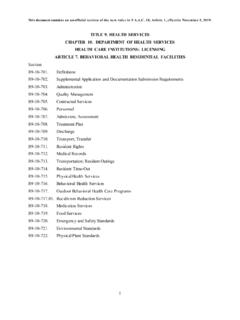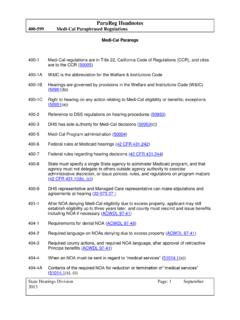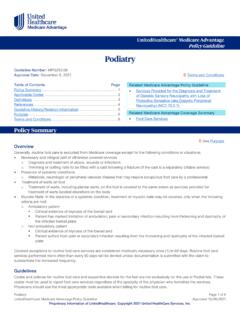Transcription of Certifying Patients for the Medicare Home Health Benefit
1 Certifying Patients for the Medicare Home Health Benefit Hillary Loeffler, Technical Advisor Dr. Crystal Simpson, Medical Officer Center for Medicare , Chronic Care Policy Group Effective as of January 1, 2015. The Medicare Learning Network . This MLN Connects National Provider Call (MLN Connects Call). is part of the Medicare Learning Network (MLN), a registered trademark of the Centers for Medicare & Medicaid Services (CMS), and is the brand name for official information Health care professionals can trust. 2. Disclaimers This presentation was current at the time it was published or uploaded onto the web. Medicare policy changes frequently so links to the source documents have been provided within the document for your reference. This presentation was prepared as a service to the public and is not intended to grant rights or impose obligations. This presentation may contain references or links to statutes, regulations, or other policy materials.
2 The information provided is only intended to be a general summary. It is not intended to take the place of either the written law or regulations. We encourage readers to review the specific statutes, regulations, and other interpretive materials for a full and accurate statement of their contents. CPT Disclaimer American Medical Association (AMA) Notice CPT codes, descriptions and other data only are copyright 2013 American Medical Association. All rights reserved. 3. Agenda Benefit Overview Patient Eligibility Certification Requirements, Including the Required Face-to-Face Encounter Recertification Requirements Resources 4. Benefit Overview Covered Medicare Home Health Services Per 1861(m) of the Social Security Act (the Act), the following are covered Medicare home Health services : Skilled nursing (SN) care (other than solely venipuncture for the purposes of obtaining a blood sample) on part-time or intermittent basis.
3 Home Health aides on a part-time or intermittent basis;. Physical therapy (PT);. Occupational therapy (OT);. Speech-language pathology (SLP);. Medical social services;. 6. Covered Medicare Home Health Services (cont.). Routine & non-routine medical supplies (for example, catheters, catheter care supplies, ostomy bags, and ostomy care supplies);. Durable medical equipment (paid separately from the home Health payment rates); and An osteoporosis drug (injectable calcitonin) as defined in 1861(kk) of the Act (reimbursed on a reasonable cost basis and the patient must meet certain criteria). 7. Excluded from Coverage under the Home Health Benefit Excluded services include: Drugs and biologicals (covered under Part B. and Part D);. Transportation;. Housekeeping services; and Services covered under End Stage Renal Disease (ESRD) program (for example, wound care for an active shunt site). 8. Patient Eligibility Patient Eligibility for Medicare Home Health Services To be eligible for Medicare home Health services, a patient must have Medicare Part A and/or Part B and, per 1814(a)(2)(C) and 1835(a)(2)(A) of the Act: 1.
4 Be confined to the home;. 2. Need skilled services;. 3. Be under the care of a physician;. 4. Receive services under a plan of care established and reviewed by a physician; and 5. Have had a face-to-face encounter with a physician or allowed non-physician practitioner (NPP). Care must be furnished by or under arrangements made by a Medicare -participating Home Health Agency (HHA). 10. Patient Eligibility: Confined to the Home Per 1814(a) and 1835(a) of the Act, an individual shall be considered confined to the home (homebound) if the following two criteria are met: Criteria One Criteria Two One Must Be Met: Both Must Be Met: Because of illness or injury, need the aid of There must exist a normal supportive devices such as crutches, canes, inability to leave home. wheelchairs, and walkers; the use of special transportation; or the assistance of another person to leave their place of residence.
5 Have a condition such that leaving his or her Leaving home must require a home is medically contraindicated. considerable and taxing effort. 11. Patient Eligibility: Confined to the Home The patient may be considered homebound (that is, confined to the home) if absences from the home are: infrequent;. for periods of relatively short duration;. for the need to receive Health care treatment;. for religious services;. to attend adult daycare programs; or for other unique or infrequent events ( , funeral, graduation, trip to the barber). 12. Patient Eligibility: Examples of Confined to the Home A patient who is blind or senile and requires the assistance of another person in leaving their place of residence. A patient who has just returned from a hospital stay, involving surgery, who may be suffering from resultant weakness and pain and; therefore, their actions may be restricted by their physician to certain specified and limited activities such as getting out of bed only for a specified period of time or walking stairs only once a day.
6 A patient with a psychiatric illness that is manifested, in part, by a refusal to leave home or is of such a nature that it would not be considered safe for the patient to leave home unattended, even if they have no physical limitations. 13. Patient Eligibility: Skilled Service Need Per 1814(a)(2)(C) and 1835(a)(2)(A) of the Act, the patient must be in need of one of the following: SN care on an intermittent basis (furnished or needed on fewer than 7 days each week or less than 8 hours each day for periods of 21 days or less, with extensions in exceptional circumstances when the need for additional care is finite and predictable per 1861(m) of the Act); or PT; or SLP services; or Continuing OT services. 14. Patient Eligibility: Under the Care of a Physician Per 1814(a)(2)(C) and 1835(a)(2)(A) of the Act, the patient must be under the care of a physician. Per 1861(r) of the Act and the Code of Federal Regulations (CFR) at 42 CFR (a)(1)(iii), a physician is a: Doctor of Medicine.
7 Doctor of Osteopathy; or Doctor of Podiatric Medicine (may perform only plan of treatment functions that are consistent with the functions he or she is authorized to perform under State law). In addition, the physician must be enrolled as a Medicare provider. 15. Patient Eligibility: Receiving Services Under a Plan of Care Per 1814(a)(2)(C) and 1835(a)(2)(A) of the Act, the patient must receive home Health services under a plan of care established and periodically reviewed by a physician. Per the regulations at 42 CFR (d)(1), a plan of care may not be established and reviewed by any physician who has a financial relationship with the HHA. The physician cannot have a financial relationship, as defined in 42 CFR , with the HHA, unless the physician's relationship meets one of the exceptions in 1877 of the Act. 16. Certification Requirements, Including the Required Face-to-Face Encounter Certification Requirements As a condition for payment, per the regulations at 42.
8 CFR (a)(1): A physician must certify that a patient is eligible for Medicare home Health services according to 42 CFR (a)(1)(i)-(v). The physician who establishes the plan of care must sign and date the certification. The Centers for Medicare & Medicaid Services (CMS). does not require a specific form or format for the certification as long as the five certification requirements, outlined in 42 CFR (a)(1), are met. 18. Certification Requirements (cont.). Per the regulations at 42 CFR (a)(2), physicians should complete the certification when the plan of care is established, or as soon as possible thereafter. The certification must be complete prior to when an HHA bills Medicare for reimbursement. It is not acceptable for HHAs to wait until the end of a 60-day episode of care to obtain a completed certification. 19. Certification Requirements (cont.). The Certifying physician must certify that: 1.
9 The patient needs intermittent SN care, PT, and/or SLP services (42 CFR (a)(1)(i));. 2. The patient is confined to the home (that is, homebound) (42 CFR (a)(1)(ii)));. 3. A plan of care has been established and will be periodically reviewed by a physician (42 CFR. (a)(1)(iii));. 4. Services will be furnished while the individual was or is under the care of a physician(42 CFR. (a)(1)(iv)); and 20. Certification Requirements (cont.). The Certifying physician must certify that: 5. Per 42 CFR (a)(1)(v), a face-to-face encounter: occurred no more than 90 days prior to the home Health start of care date or within 30 days of the start of the home Health care, was related to the primary reason the patient requires home Health services, and was performed by a physician or allowed non-physician practitioner. The Certifying physician must also document the date of the encounter. 21. Certification Requirements: Face-to-Face Encounter Per 42 CFR (a)(1)(v )(A), the face-to-face encounter can be performed by: The Certifying physician.
10 The physician who cared for the patient in an acute or post-acute care facility (from which the patient was directly admitted to home Health );. A nurse practitioner or a clinical nurse specialist who is working in collaboration with the Certifying physician or the acute/post-acute care physician; or A certified nurse midwife or physician assistant under the supervision of the Certifying physician or the acute/post-acute care physician. Per 42 CFR (d)(2), the face-to-face encounter cannot be performed by any physician or allowed NPP (listed above) who has a financial relationship with the HHA. 22. Certification Requirements: Management &. Evaluation Narrative Per 42 CFR (a)(1)(i), if a patient's underlying condition or complication requires a registered nurse (RN) to ensure that essential non-skilled care is achieving its purpose and a RN. needs to be involved in the development, management, and evaluation of a patient's care plan, the physician will include a brief narrative describing the clinical justification of this need.
